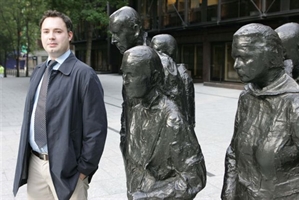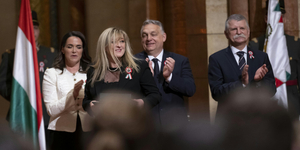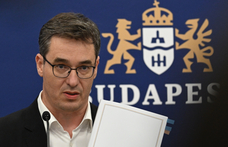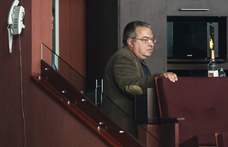 © Dudás Szabolcs |
Is there or is there not an economic and financial crisis in Hungary?
The Hungarian government is certainly in a very difficult situation because of the extraordinarily high budget deficit. But I would not use the word crisis. In terms of added value and productivity, Hungary is doing better than Poland or Slovakia, for example. It's this economic background that underpins the reforms announced by the Gyurcsany government.
If things are so rosy, why did Fitch downgrade the outlook for Hungary's long-duration foreign currency debt from stable to negative a few weeks ago?
Because the demand for Ferenc Gyurcsany's resignation and the tense political situation could undermine the economic reform programme, plans for cutting the budget deficit, and could reduce the government's appetite for carrying out the plans it has already announced, and things could get worse.
We expected Moody's, S&P and Fitch to rerate Hungary, but Fitch moved even before the local elections. Why?
We analyse a range of economic and political factors. We don't just look at the central budget and government debt, but we also look at the public mood and political movements. The local elections were just one factor that contributed to this decision. We thought the local elections would increase pressure on the prime minister just as much as the continuing protests, the commemoration of the 1956 revolution and the Socialist Party's congress.
Do you bear in mind the opinions of the other two agencies?
We are aware of their moves, but they don't influence our decisions. We use different techniques. We assess the budget's financing needs differently. We use all the public data we can get our hands on, we look at information from the IMF, and we consult with governments, private investors and foreign analysts. We have two specialists dealing directly with the country, but the rating decision is taken by a larger committee.
Will this downgrade convince foreign investors that they would be better off taking their money out immediately?
There's something to this, but investors are waiting and seeing for the moment. How long they are prepared to do this for is the million dollar question. Their patience is determined by how long the pressure on the government and the Socialists is maintained for. The Hungarian economy is very fragile at the moment. Any loss of market confidence could lead to capital withdrawal and a weakening in the forint. Recent events have increased this risk. A weakened forint could increase external indebtedness, and individuals could find themselves in trouble given the high level of exposure to foreign currency-denominated personal loans.
How can the Hungarian economy get out of this situation?
The budget must be brought under control in the short term. The question is whether moves in this direction will be effective, whether reforms will reduce the budget's financing needs, and whether the government can resist the temptation to go on a spending spree before the 2010 elections. If the government manages to convince the markets that they are serious about completing the reforms, this could itself raise the effectiveness of the reforms in medium-term, making it easier for the government to deal with any unexpected problems.
Second part of the interview (Oldaltörés)
 © Dudás Szabolcs |
The coalition claims its approach is the only way of implementing the convergence programme that the EU accepted last Friday. Do you agree?
You have no alternative to cutting the budget deficit and carrying out reforms. But these reforms can be carried out in a number of different ways. Ference Gyurcsany is only offering one possible solution. Transparency has been improved with the government's decision to place items like motorway building on the central budget. The important things is that the professed aims should appear genuine. We stick to the criticism we made in June, that it is no good if the government's savings measures focus on increasing revenues while doing nothing about expenditure. An excessive focus on increasing taxes might undermine the country's competitiveness.
Many have argued that Viktor Orban's latest idea, that of a National Reform Fund, is just a kind of concealed tax hike.
Without knowing the details I'm unwilling to comment on this. It is not clear where the money in this fund would come from, and, most importantly, what reforms there would be.
Is Hungary's rating going to stay the same for a while? Or could there be another change?
We always monitor developments. There is no deadline. But since the government's measures will take two years to have an appreciable impact, we don't see much reason for a change now.
Even if Ferenc Gyurcsany were forced to leave office?
Not necessarily. Our ratings depend on the circumstances. For instance, if the prime minister resigned because the government programme were collapsing. We don't look at individuals. We look at whether the government is doing what it said it would. We think reforms can be carried out with or without Gyurcsany.
KÁROLY CSABAI


















